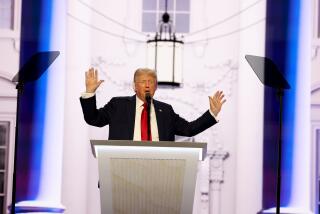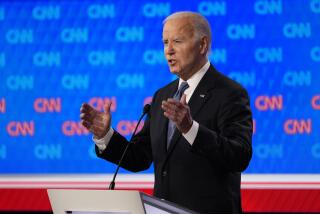A Polished Bush Still a Work in Progress
AUSTIN, Texas — Gov. George W. Bush, the presumptive Republican nominee for president, was knocked down but climbed back up--a much admired trait in this scrappy state, where there’s no shame in failure but the greatest sin is giving up.
“I feel battle-tested,” Bush said after winning big on Super Tuesday near the end of the bruising primary season. “And that’s what a lot of people wanted to see, whether or not I could come through a tough primary intact. And I feel great.”
He should feel great. In his yearlong quest for the GOP crown, he has grown from a skittish debater into a forceful presence and, when necessary, has gotten in touch with his pugnacious side--don’t call it nasty, at least not when he’s around. He’s delivered half a dozen detailed policy addresses, more than anyone in Campaign 2000 except for Vice President Al Gore. Other major policy announcements, he promises, are in the works.
But for all that Bush has evolved on the campaign trail, candidate and campaign are still under construction as they head into what promises to be one of the longest and testiest general election campaigns in recent years.
While Bush interacts more with Bush voters and reporters, he still relies heavily on canned lines from his stump speech, sounding at times like a political jukebox, awkward, stilted. B6: Rally the armies of compassion. A8: Tear down the toll booth to the middle class. C7: Make sure the American dream touches every willing heart.
In the past year, he has caromed from new-breed compassionate conservatism to defender of the old Republican right; as he scrambles back to the moderate middle, subtlety is far from his strong suit.
Talking about tolerance? Put on a yarmulke, visit the Simon Wiesenthal Center and light the memorial flame. Wooing women? Slap on a breast cancer awareness pin and appear with a cancer survivor who proudly proclaims that she “sits here with one breast.”
But he has been fiercely disciplined in staying on message--particularly while focusing on education in the weeks before the California primary, even if that message and its delivery are still works in progress. If anything, some analysts say, the messenger has probably shown more improvement than the message.
“They’ve got some message troubles,” says political consultant Nelson Warfield. “They know how to load up and fire. Have they found the right rounds? I don’t know. . . . They’re still searching for the right mix of comparative Clinton-Gore jab and the more hopeful George Bush message.”
To talk about the trajectory of Bush, it helps to sketch out the highs and lows of Bush, the campaign juggernaut.
Starting out the flush-with-cash, odds-on favorite, Bush won the Iowa caucuses then lost big in New Hampshire. He landed in South Carolina at fundamentalist Bob Jones University--where officials have espoused anti-Catholic views and where interracial dating was banned until recently--and proceeded to paint himself as a Christian conservative savior to lead the Republican base.
After winning in South Carolina, he lost again three days later in more moderate Michigan. He then turned away from the far right, appearing at campaign events with Latinos, women, teachers, Catholics, Jews.
The Bob Jones University visit, with Bush’s fiery defense of conservative values, is perhaps the most telling moment of Bush’s primary campaign.
Bush started out espousing an attractive inclusiveness. But the visit to Bob Jones “created false signals . . . an image of intolerance” that has muddled his real message just when voters are trying to figure out who he is, says Allan Hoffenblum, a GOP consultant based in Los Angeles.
“He’s evolved into someone who really wants the job and is fighting to get it,” Hoffenblum says. “But that hasn’t resolved who the real George W. is. We can’t have multiple George Bushes running for president.”
Another message hurdle that Bush still must vault has to do with his campaign’s emphasis on tax cuts, which polls show simply do not interest voters. A good economy is one reason that cuts have not resonated; greater concerns about protecting Social Security and Medicare are another.
If the $1.7-trillion, 10-year tax cut didn’t wow fiscally conservative Republicans in the primary season, how can it appeal to Democrats and independents in the fall?
“There’s just not a whole lot of heads nodding up and down” when Bush talks about taxes, says Charles Cook, a nonpartisan political analyst. Tax cuts are “not salient this year, but it’s how he protects his conservative base. . . . Clearly he’s a work in progress; he’s not there yet.”
For now, there is little indication that Bush will shift gears on taxes any time soon. “They tell me the polls say the American people don’t want tax relief and tax reform,” he said last Thursday in Provo, Utah. “I don’t care what the polls say. . . . When I become the president, we will pass some of the surplus back to the people who pay the bills.”
In a year spent alternately blossoming and blundering, Bush’s most dramatic improvement to date has been as a campaign performer. He has tossed aside his stodgy beginnings--long speech, serious lectern--in favor of the casual Q&A;, the only thing between him and his supporters a slim, silver microphone stand.
While his campaign staff is uncomfortable talking about the candidate’s growth--after all, it implies that he needed improving in the first place--they do acknowledge that he’s most on the mark when dealing directly with the public.
“The governor is at his best when people can see him one-on-one for who he is,” says spokesman Scott McClellan, which is probably why his strategists dubbed his new format “One on One With Governor Bush.”
His biggest leap in campaign performance can be seen on the debate floor. His early Campaign 2000 efforts had a lot in common with a bad first date--polite, uncomfortable affairs with an emphasis on caution, where everyone went home more than a little unsatisfied.
If Bush revealed much of anything about himself during the early forums, it was that he was overly reliant on stock lines from his stump speech--and a little imperious. Asked how he would save his tax cuts if necessary budget surpluses failed to materialize, he replied: “I refuse to accept the premise that surpluses are going to decline. If I’m the president, I think they’re going to increase.”
There’s a different George W. Bush today. During the most recent Republican debate, on March 2 in Los Angeles, Bush was deft, confident, funny, at the same time rhetorically besting his most serious rival, John McCain.
Bush and McCain tangled during the forum over the Texan’s appearance at Bob Jones University. After the appearance, McCain’s campaign had engineered a round of phone calls to voters criticizing Bush’s visit.
During the debate, McCain insisted the calls did not accuse Bush of bigotry, to which Bush responded acidly, “If you don’t think those phone calls label me an anti-Catholic bigot, then you weren’t paying attention to what your campaign was putting out.”
There are several reasons why Bush’s debating skills have improved at a greater speed than his general performance on the stump. Don Sipple, who worked with Bush during his 1994 race for governor, describes the candidate as “resistant to handling. He thinks it’s intellectually dishonest.”
In fact, spokesman McClellan says Bush has not been coached at all on his speaking skills. He’ll do a run-through of his most important speeches, but that’s about it. Debating is a different story. “After a couple of the early debates, we showed him a video so he could make adjustments,” McClellan said.
Republican pollster Tony Fabrizio views Bush’s first forays as presidential campaigner and debater as “worlds apart” from the man who all but clinched the Republican nomination last week. “I think he’s overall done much, much better as a candidate, whether it’s the way he comes across on television, articulating what he believes, emoting passion, carrying himself,” Fabrizio says. “McCain was a good sparring partner for going up against Gore, who is no wilting flower.”
All true, concurs GOP strategist Rich Galen, who also thinks that the campaign has become more strategically nimble in the past year. Still, Galen thinks that the “single biggest advance” both campaign and candidate have made is that in 2000 they learned “to take a punch.”
If the Republican establishment still harbors questions about Bush, they are about how many more punches Bush is capable of taking as he goes up against a Democratic rival they variously describe as “a robot,” “an animal,” “ruthless.”
Bush did bounce back from McCain’s attacks, however. And he’s learned how to throw knockout blows at others. He came out swinging all last week against his Democratic rival, accusing him of hypocrisy, tarring him with what Republicans view as the evil of the “Clinton-Gore administration.”
The question, of course, is whether that will be enough.
Bush “does not have ambition and lust for power pouring from every pore in his body,” says GOP consultant Kevin Spillane. “Gore is willing to do anything or say anything to get elected. I’m not sure George W. is. That makes him a better man, not a better candidate.”
More to Read
Get the L.A. Times Politics newsletter
Deeply reported insights into legislation, politics and policy from Sacramento, Washington and beyond. In your inbox three times per week.
You may occasionally receive promotional content from the Los Angeles Times.











